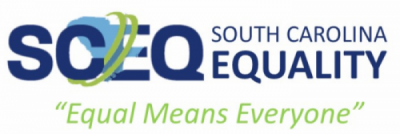Our Legislative Agenda
2020 Legislative Agenda
HELP US BUILD A SOUTH CAROLINA WHERE EVERYONE IS TREATED WITH DIGNITY AND RESPECT.
For 18 years, SC Equality has been dedicated to advancing and protecting LGBTQ rights. As the 2020 South Carolina Legislative Session gavels in, we’re ready to take the fight to the Capitol.
Our top priority in 2020 is working with champions of equality in the South Carolina Legislature to advance comprehensive non-discrimination protections for all LGBTQ South Carolinians, including the passage of an all inclusive hate crime bill.
Uniform Non Discrimination
Despite the significant progress our community has made, there is still no statewide law that prohibits discrimination against LGBTQ people in South Carolina. This means that, according to state law, it is legal to fire someone, evict them from housing, or deny them service at a restaurant just because they are lesbian, gay, bisexual, transgender, or queer (LGBTQ). While it is illegal to discriminate in employment, housing and public accommodations based race, color, religion, sex, pregnancy, national origin, age, handicap or marital status, the LGBTQ community is currently left out of statewide non-discrimination protections.
Workplace Non Discrimination
South Carolina still lacks comprehensive workplace non-discrimination protections for LGBTQ South Carolinians, SC Equality is committed to both legislative and public education efforts to raise awareness about the discrimination against LGBTQ employees in the Palmetto State.
Legislative workplace non-discrimination protections are crucial to ensuring that LGBTQ people are free to work without the fear that they may face bias or discrimination because of their identity.
Workplace Non Discrimination
South Carolina still lacks comprehensive workplace non-discrimination protections for LGBTQ South Carolinians, SC Equality is committed to both legislative and public education efforts to raise awareness about the discrimination against LGBTQ employees in the Palmetto State.
Legislative workplace non-discrimination protections are crucial to ensuring that LGBTQ people are free to work without the fear that they may face bias or discrimination because of their identity.
Adoption Discrimination
S.C. Equality, Lambda Legal, the American Civil Liberties Union, and the ACLU’s South Carolina chapter filed suit in U.S. District Court in downtown Charleston. Various organizations are suing the state and federal governments on behalf of a married gay couple who was denied services at a Greenville foster care agency earlier this year.
The complaint centers on Brandy Welch and Eden Rogers, a Unitarian Universalist couple who has been married for three years and has two daughters aged 7 and 10. In April, 2019 they decided to open their home to foster children and submit an online application with Greenville-based Miracle Hill Ministries, according to S.C. Equality.
Parental Rights
Gay and transgender people become parents in diverse ways including adoption, technology, and previous heterosexual relationships. These families deserve the same protections that other families receive. Unfortunately, current laws have created some barriers to securing legal protections. Family decisions should be made by parents and professionals, not politicians. SC Equality will be working in 2018 to have some of these barriers removed.
Parental Rights
Gay and transgender people become parents in diverse ways including adoption, technology, and previous heterosexual relationships. These families deserve the same protections that other families receive. Unfortunately, current laws have created some barriers to securing legal protections. Family decisions should be made by parents and professionals, not politicians. SC Equality will be working in 2018 to have some of these barriers removed.
Youth and Safe Schools
SC Equality is committed to ensuring a future where every student who walks the halls of our schools and who sits at the desks in our classrooms is safe and protected.
At SC Equality, our safe schools initiatives have taken many forms, from legislative to educational.
Hate Crimes
HATE CRIMES ARE ON THE RISE, BUT SOUTH CAROLINA DOESN’T HAVE LAWS TO PROTECT VICTIMS OR PUNISH OFFENDERS.
Due to the rise of offenses against the LGBTQ community, any effective hate crime legislation introduced at the state level must include sexual orientation and gender identity protections. Unfortunately, some legislators in South Carolina are blocking the inclusions of sexual orientation and gender identity from proposed legislation — hence blocking progress on enacting a meaningful and effective hate crime law.
SC Equality, in partnership with various other civil rights groups, continue to pressure members of the S.C. General Assembly to pass a hate crime bill that is all inclusive.
Hate Crimes
HATE CRIMES ARE ON THE RISE, BUT SOUTH CAROLINA DOESN’T HAVE LAWS TO PROTECT VICTIMS OR PUNISH OFFENDERS.
Due to the rise of offenses against the LGBTQ community, any effective hate crime legislation introduced at the state level must include sexual orientation and gender identity protections. Unfortunately, some legislators in South Carolina are blocking the inclusions of sexual orientation and gender identity from proposed legislation — hence blocking progress on enacting a meaningful and effective hate crime law.
SC Equality, in partnership with various other civil rights groups, continue to pressure members of the S.C. General Assembly to pass a hate crime bill that is all inclusive.
Gun Reform
SC Equality pushes lawmakers to pass gun reform in 2020 legislative session– expand to five days from three the period that the FBI has to conduct a background check for a gun purchase, speed up how quickly criminal convictions and court orders must be added to the background check system and close the “Charleston loophole,” which allowed the gunman in the 2015 Charleston church massacre to buy a gun despite his criminal record when the three-day background-check period expired.
